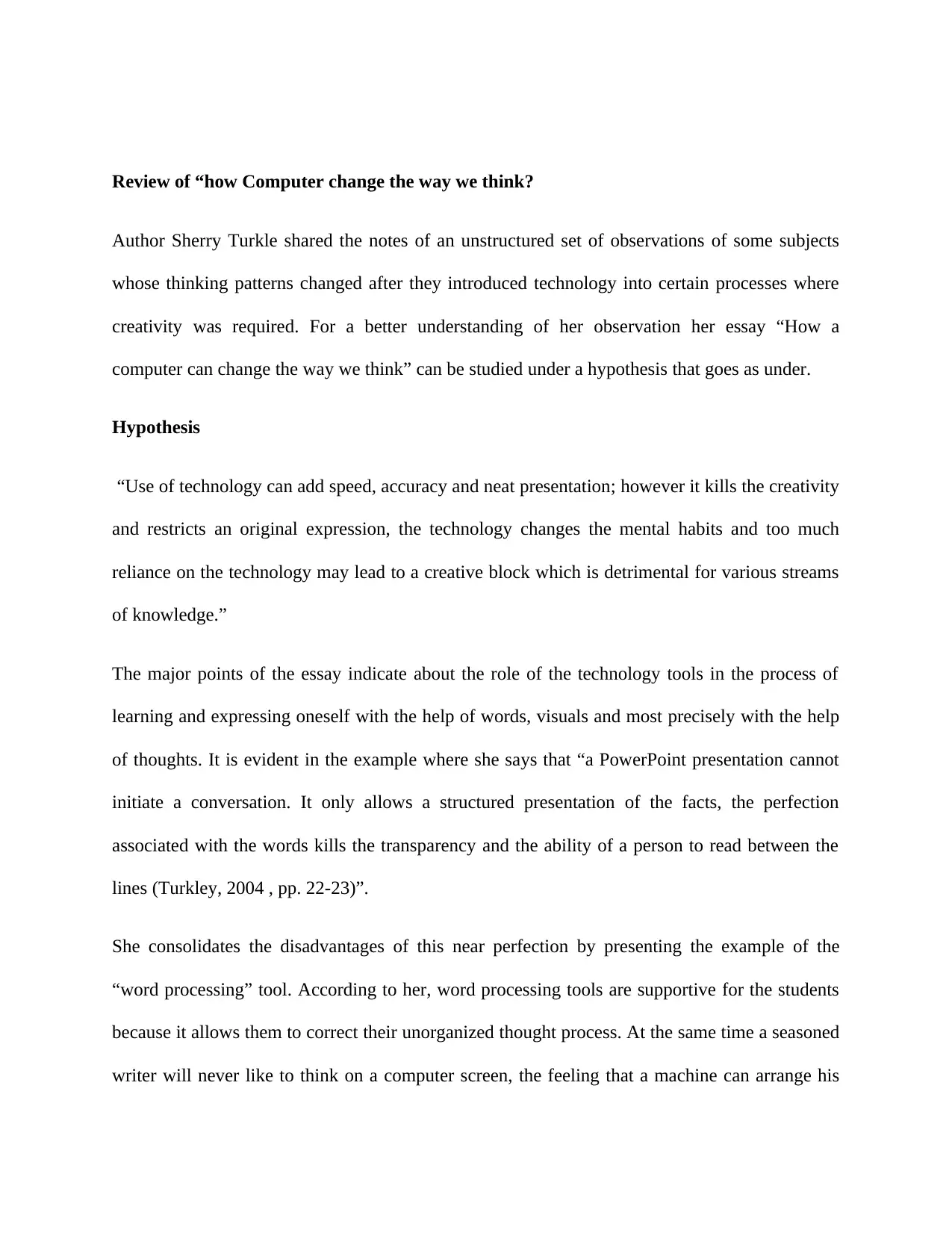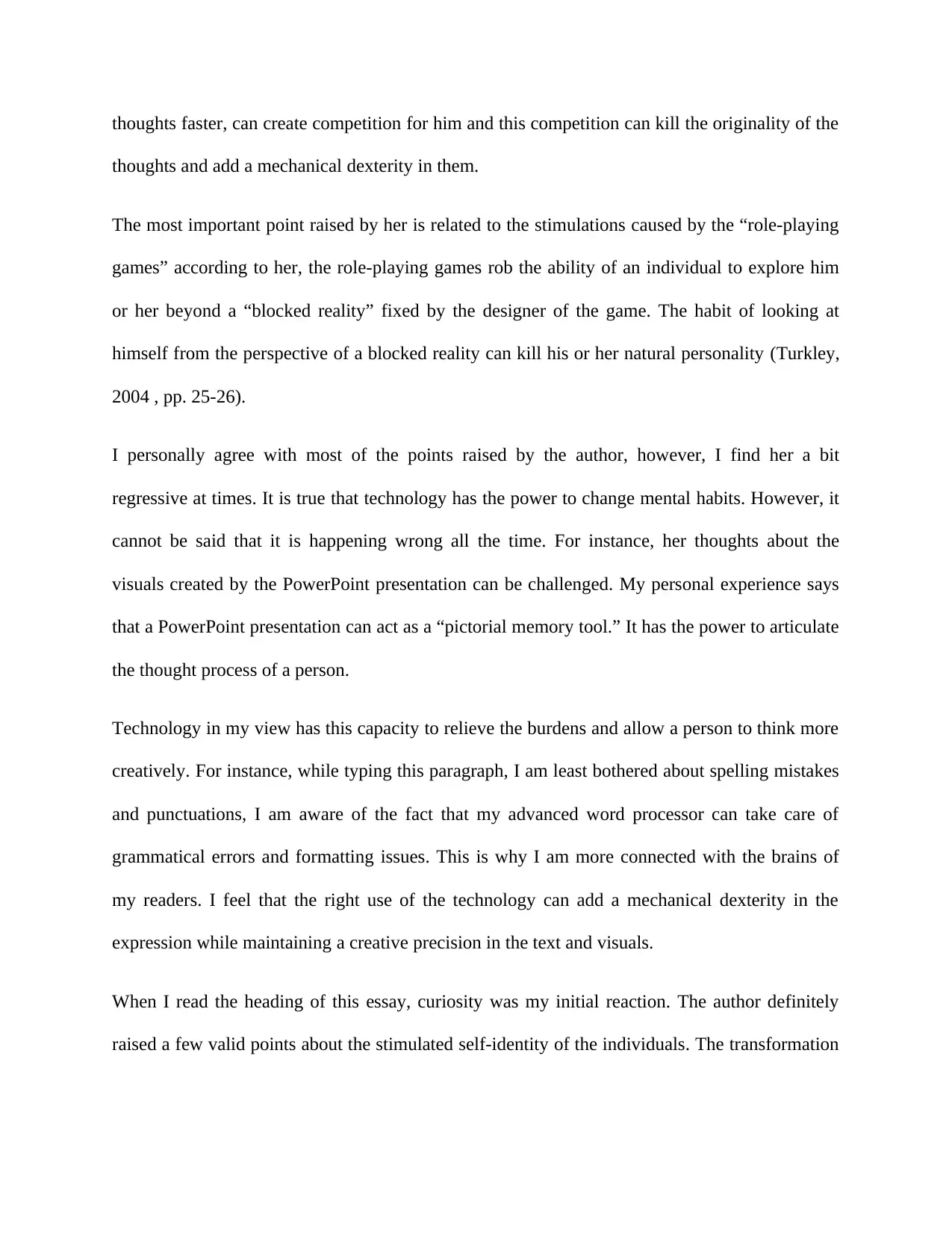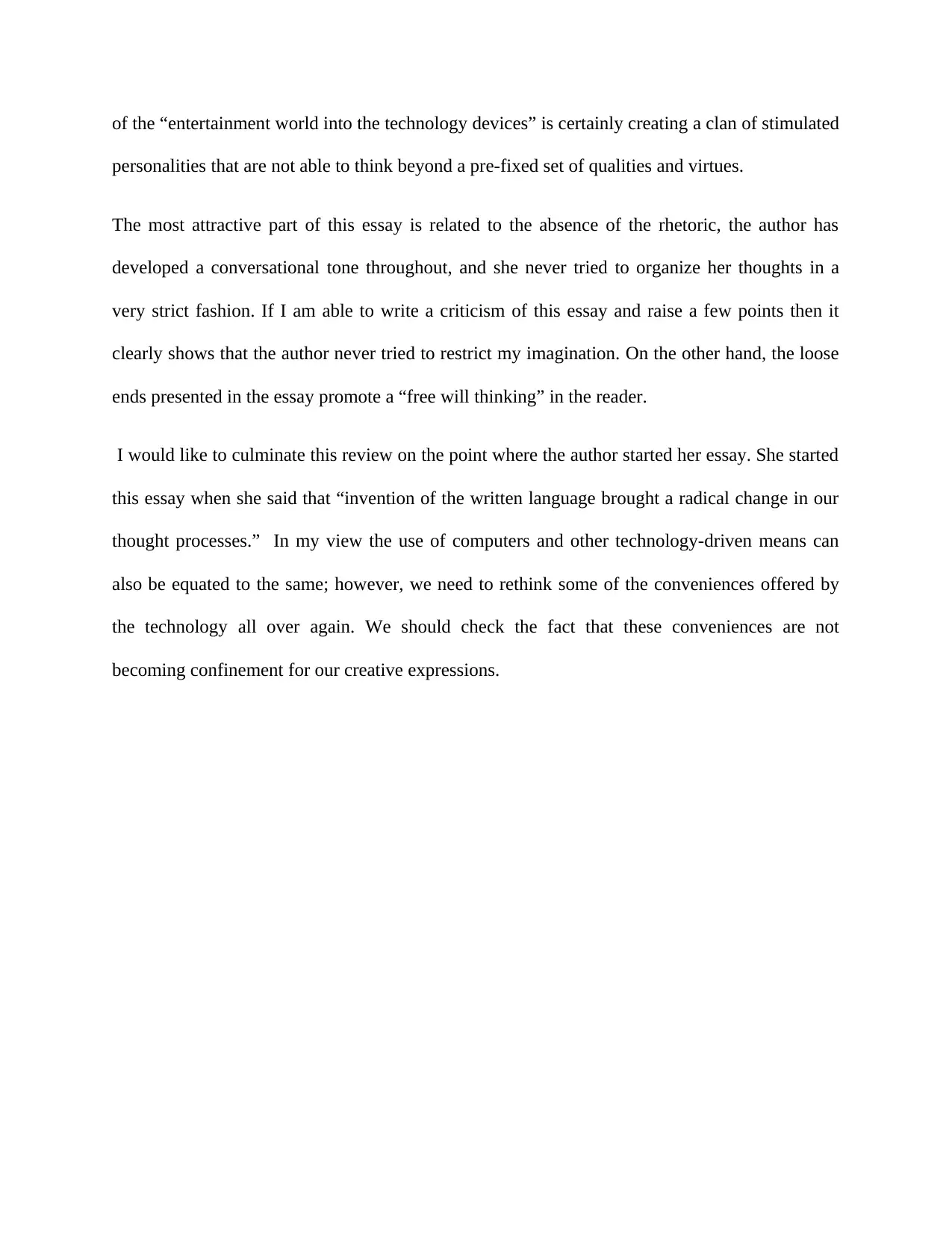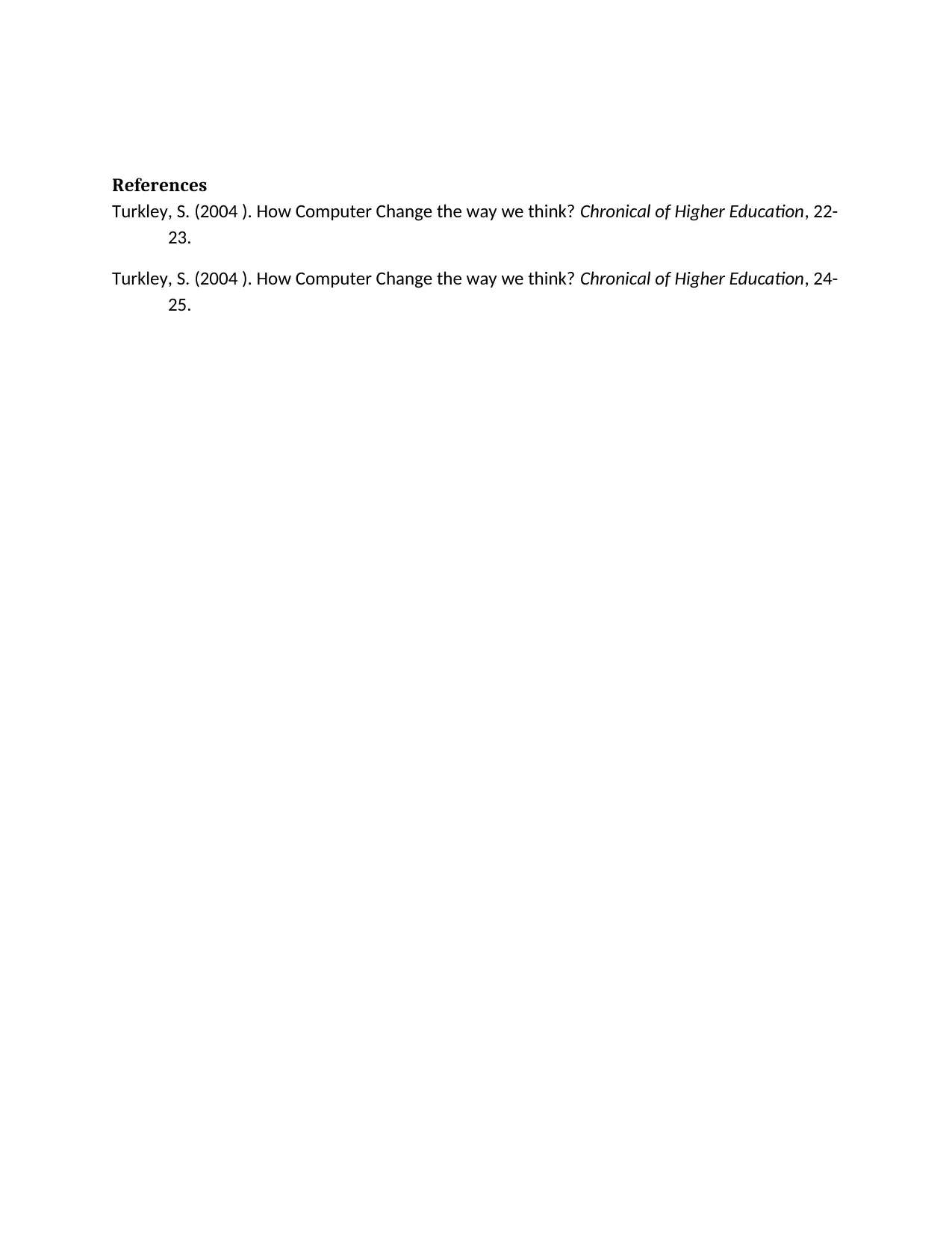How Computer Changed The Way We Think - Article
VerifiedAdded on 2022/08/12
|5
|903
|18
AI Summary
Contribute Materials
Your contribution can guide someone’s learning journey. Share your
documents today.

Secure Best Marks with AI Grader
Need help grading? Try our AI Grader for instant feedback on your assignments.

Review of “how Computer change the way we think?
Author Sherry Turkle shared the notes of an unstructured set of observations of some subjects
whose thinking patterns changed after they introduced technology into certain processes where
creativity was required. For a better understanding of her observation her essay “How a
computer can change the way we think” can be studied under a hypothesis that goes as under.
Hypothesis
“Use of technology can add speed, accuracy and neat presentation; however it kills the creativity
and restricts an original expression, the technology changes the mental habits and too much
reliance on the technology may lead to a creative block which is detrimental for various streams
of knowledge.”
The major points of the essay indicate about the role of the technology tools in the process of
learning and expressing oneself with the help of words, visuals and most precisely with the help
of thoughts. It is evident in the example where she says that “a PowerPoint presentation cannot
initiate a conversation. It only allows a structured presentation of the facts, the perfection
associated with the words kills the transparency and the ability of a person to read between the
lines (Turkley, 2004 , pp. 22-23)”.
She consolidates the disadvantages of this near perfection by presenting the example of the
“word processing” tool. According to her, word processing tools are supportive for the students
because it allows them to correct their unorganized thought process. At the same time a seasoned
writer will never like to think on a computer screen, the feeling that a machine can arrange his
Author Sherry Turkle shared the notes of an unstructured set of observations of some subjects
whose thinking patterns changed after they introduced technology into certain processes where
creativity was required. For a better understanding of her observation her essay “How a
computer can change the way we think” can be studied under a hypothesis that goes as under.
Hypothesis
“Use of technology can add speed, accuracy and neat presentation; however it kills the creativity
and restricts an original expression, the technology changes the mental habits and too much
reliance on the technology may lead to a creative block which is detrimental for various streams
of knowledge.”
The major points of the essay indicate about the role of the technology tools in the process of
learning and expressing oneself with the help of words, visuals and most precisely with the help
of thoughts. It is evident in the example where she says that “a PowerPoint presentation cannot
initiate a conversation. It only allows a structured presentation of the facts, the perfection
associated with the words kills the transparency and the ability of a person to read between the
lines (Turkley, 2004 , pp. 22-23)”.
She consolidates the disadvantages of this near perfection by presenting the example of the
“word processing” tool. According to her, word processing tools are supportive for the students
because it allows them to correct their unorganized thought process. At the same time a seasoned
writer will never like to think on a computer screen, the feeling that a machine can arrange his

thoughts faster, can create competition for him and this competition can kill the originality of the
thoughts and add a mechanical dexterity in them.
The most important point raised by her is related to the stimulations caused by the “role-playing
games” according to her, the role-playing games rob the ability of an individual to explore him
or her beyond a “blocked reality” fixed by the designer of the game. The habit of looking at
himself from the perspective of a blocked reality can kill his or her natural personality (Turkley,
2004 , pp. 25-26).
I personally agree with most of the points raised by the author, however, I find her a bit
regressive at times. It is true that technology has the power to change mental habits. However, it
cannot be said that it is happening wrong all the time. For instance, her thoughts about the
visuals created by the PowerPoint presentation can be challenged. My personal experience says
that a PowerPoint presentation can act as a “pictorial memory tool.” It has the power to articulate
the thought process of a person.
Technology in my view has this capacity to relieve the burdens and allow a person to think more
creatively. For instance, while typing this paragraph, I am least bothered about spelling mistakes
and punctuations, I am aware of the fact that my advanced word processor can take care of
grammatical errors and formatting issues. This is why I am more connected with the brains of
my readers. I feel that the right use of the technology can add a mechanical dexterity in the
expression while maintaining a creative precision in the text and visuals.
When I read the heading of this essay, curiosity was my initial reaction. The author definitely
raised a few valid points about the stimulated self-identity of the individuals. The transformation
thoughts and add a mechanical dexterity in them.
The most important point raised by her is related to the stimulations caused by the “role-playing
games” according to her, the role-playing games rob the ability of an individual to explore him
or her beyond a “blocked reality” fixed by the designer of the game. The habit of looking at
himself from the perspective of a blocked reality can kill his or her natural personality (Turkley,
2004 , pp. 25-26).
I personally agree with most of the points raised by the author, however, I find her a bit
regressive at times. It is true that technology has the power to change mental habits. However, it
cannot be said that it is happening wrong all the time. For instance, her thoughts about the
visuals created by the PowerPoint presentation can be challenged. My personal experience says
that a PowerPoint presentation can act as a “pictorial memory tool.” It has the power to articulate
the thought process of a person.
Technology in my view has this capacity to relieve the burdens and allow a person to think more
creatively. For instance, while typing this paragraph, I am least bothered about spelling mistakes
and punctuations, I am aware of the fact that my advanced word processor can take care of
grammatical errors and formatting issues. This is why I am more connected with the brains of
my readers. I feel that the right use of the technology can add a mechanical dexterity in the
expression while maintaining a creative precision in the text and visuals.
When I read the heading of this essay, curiosity was my initial reaction. The author definitely
raised a few valid points about the stimulated self-identity of the individuals. The transformation

of the “entertainment world into the technology devices” is certainly creating a clan of stimulated
personalities that are not able to think beyond a pre-fixed set of qualities and virtues.
The most attractive part of this essay is related to the absence of the rhetoric, the author has
developed a conversational tone throughout, and she never tried to organize her thoughts in a
very strict fashion. If I am able to write a criticism of this essay and raise a few points then it
clearly shows that the author never tried to restrict my imagination. On the other hand, the loose
ends presented in the essay promote a “free will thinking” in the reader.
I would like to culminate this review on the point where the author started her essay. She started
this essay when she said that “invention of the written language brought a radical change in our
thought processes.” In my view the use of computers and other technology-driven means can
also be equated to the same; however, we need to rethink some of the conveniences offered by
the technology all over again. We should check the fact that these conveniences are not
becoming confinement for our creative expressions.
personalities that are not able to think beyond a pre-fixed set of qualities and virtues.
The most attractive part of this essay is related to the absence of the rhetoric, the author has
developed a conversational tone throughout, and she never tried to organize her thoughts in a
very strict fashion. If I am able to write a criticism of this essay and raise a few points then it
clearly shows that the author never tried to restrict my imagination. On the other hand, the loose
ends presented in the essay promote a “free will thinking” in the reader.
I would like to culminate this review on the point where the author started her essay. She started
this essay when she said that “invention of the written language brought a radical change in our
thought processes.” In my view the use of computers and other technology-driven means can
also be equated to the same; however, we need to rethink some of the conveniences offered by
the technology all over again. We should check the fact that these conveniences are not
becoming confinement for our creative expressions.
Secure Best Marks with AI Grader
Need help grading? Try our AI Grader for instant feedback on your assignments.

References
Turkley, S. (2004 ). How Computer Change the way we think? Chronical of Higher Education, 22-
23.
Turkley, S. (2004 ). How Computer Change the way we think? Chronical of Higher Education, 24-
25.
Turkley, S. (2004 ). How Computer Change the way we think? Chronical of Higher Education, 22-
23.
Turkley, S. (2004 ). How Computer Change the way we think? Chronical of Higher Education, 24-
25.
1 out of 5
Related Documents
Your All-in-One AI-Powered Toolkit for Academic Success.
+13062052269
info@desklib.com
Available 24*7 on WhatsApp / Email
![[object Object]](/_next/static/media/star-bottom.7253800d.svg)
Unlock your academic potential
© 2024 | Zucol Services PVT LTD | All rights reserved.





